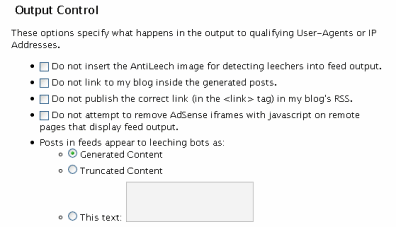We’ve all seen those anti-piracy ads that Hollywood is so fond of. You know, the ones about stealing cars, DVDs, and purses. The ad tries to tell us that if we don’t steal any of those things, then we shouldn’t pirate movies either. Perhaps Hollywood should add one more item in there along with the cars and purses: “You wouldn’t steal anybody’s web content, right?” If you are a writer for the web, you should be worried about people stealing something that is very dear to you: your content.
Why on Earth would someone want to steal your content — your written text that you have spent hours upon hours creating? The amount of time and sweat that is put into creating content is tremendous; now some creep can come along and steal what is rightfully yours.
An increasing pain among content-generators (aka, bloggers) is the common splog, or spam blog. These blogs can take the form of blogs with randomly generated keywords that make absolutely no sense. They can also take the form of your content with a bunch of ads interspersed. With splogs taking your content and advertising within, that means that someone else is making money on the content you are creating! So what do you do about it?
Fortunately, for those who use the WordPress blogging platform, there are several plugins that assist bloggers against the evil splogs. One of the more notable plugins I have come across is called AntiLeech. I will devote the rest of this entry as a review of the plugin and how it deters sploggers.
AntiLeech Description
As described on the AntiLeech plugin page, AntiLeech does not stop sploggers from accessing your content. The plugin does, however, allow you to control what content the splogger receives.
Installation
Installation of the plugin is relatively straightforward. Just unzip the .php file in your WordPress plugin directory on your web server. From there, you can activate or deactivate the plugin within the “Plugins” Administration Panel.
One thing to note here is that if you have Steve Smith’s(Ordered List ) FeedBurner Plugin installed, now is the time to deactivate it. The reason is that AntiLeech and the FeedBurner Plugin do not play well together. Never fear, because AntiLeech has its own FeedBurner redirect.
Configuring the FeedBurner Redirect
You’ll find all of AntiLeech’s options under the Options Administration Panel. Here are a few steps to follow to make sure your FeedBurner redirect is successful:
- Edit your feed details at FeedBurner and change the url to:
http://www.yoursite.com/feed - Under AntiLeech’s plugin options, enter your FeedBurner Address under FeedBurner URL.
- Select what you want included in the feed.
- Click “Update.”
That should about do it for the FeedBurner redirect.
Configure the Splog Content
Here is where the magic of AntiLeech begins. You can choose what content sploggers receive.

In order to detect leechers, AntiLeech places a small image that says “ANTILEECH” at the bottom of every feed entry. You can enable or disable this option.
You can also choose not to include links back to your content. This is where everything gets controversial. Sploggers can potentially kill your search engine rank because there is duplicate content out there. The search engines might eventually think that you are spamming as well. One of the ways to combat this is to give the splogger garbled content, but still include a link back to your site. Now will Google punish you if a splogger links back to your site? I leave that answer open for debate. The point is, the choice is yours if you want the splogger to have a link back to your site.
You can also change the content that the splogger will receive. Here is an example of what the splogger might receive using Generated Content. You can also choose to give the splogger Truncated Content (post summaries) or alternatively leave some choice words for the would-be splogger.
Choosing a Splogger
There are two ways you can set up who is or isn’t a splogger: one is by User-Agent, and the other is by IP Address.
You can add a splogger by User-Agent by selecting any User-Agent that AntiLeech has detected. You can also manually add in a User-Agent.

If AntiLeech hasn’t detected any User-Agent, but you have noticed a couple of IP Addresses that are sucking down your pages, you can add those IP Addresses to your splog list.

Conclusion
Overall, I feel that the AntiLeech plugin for WordPress is very well done. One thing I would like to see in a future release is some statistics for the added IP Addresses and User-Agents (such as highest daily page view). Of course I could always view my site stats, but this way the information would all be in one place.
If you have WordPress, hate people stealing your content, and want to get back at the evil sploggers, then AntiLeech should be your anti-splog plugin.
